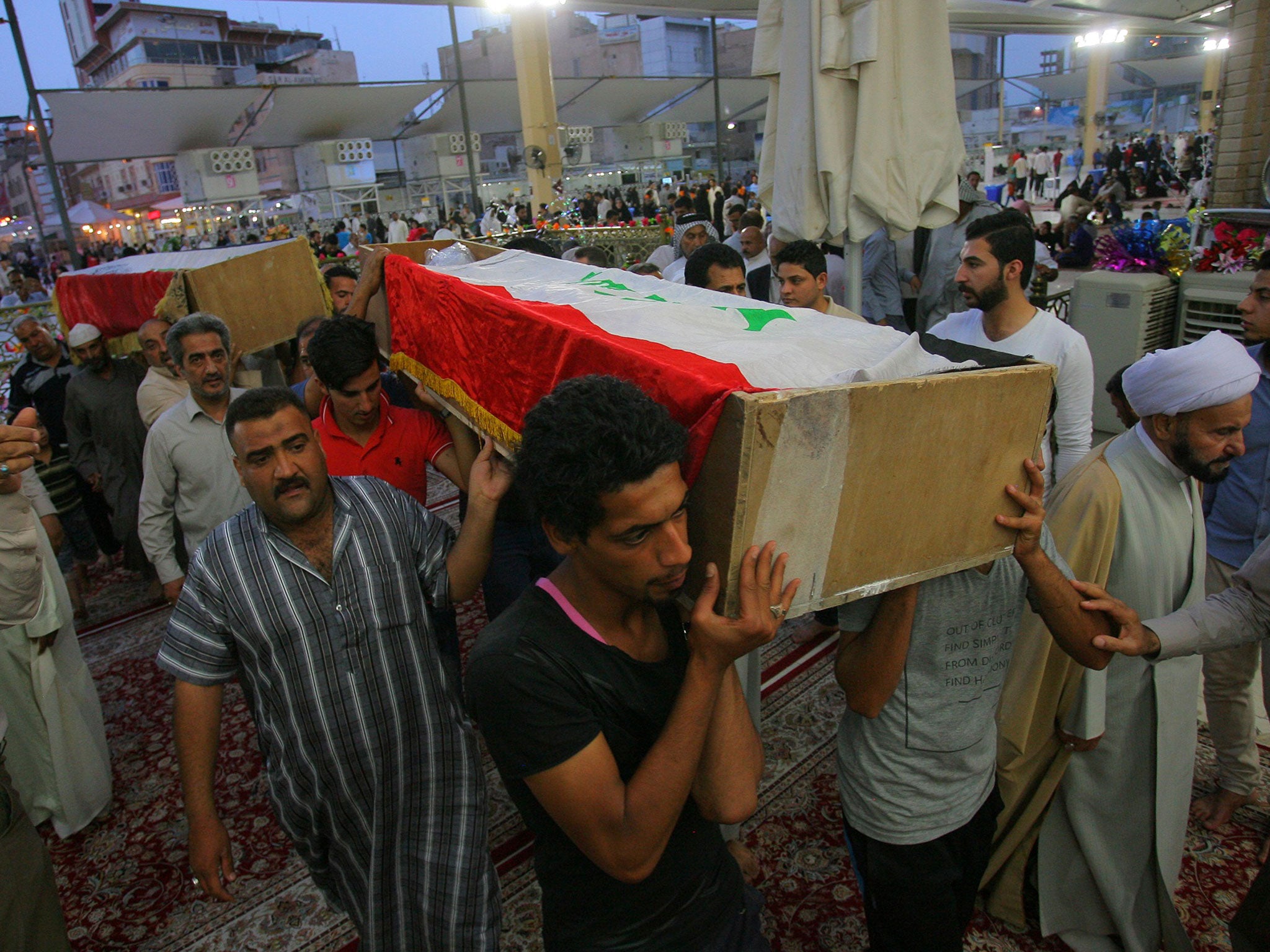Baghdad bombings: Isis kills more than 100 people in 24 hours of suicide attacks and car bombings in Iraq capital
A twin suicide bombing hit a police station at dawn on Thursday, following the bloodiest day so far this year

Your support helps us to tell the story
From reproductive rights to climate change to Big Tech, The Independent is on the ground when the story is developing. Whether it's investigating the financials of Elon Musk's pro-Trump PAC or producing our latest documentary, 'The A Word', which shines a light on the American women fighting for reproductive rights, we know how important it is to parse out the facts from the messaging.
At such a critical moment in US history, we need reporters on the ground. Your donation allows us to keep sending journalists to speak to both sides of the story.
The Independent is trusted by Americans across the entire political spectrum. And unlike many other quality news outlets, we choose not to lock Americans out of our reporting and analysis with paywalls. We believe quality journalism should be available to everyone, paid for by those who can afford it.
Your support makes all the difference.Isis has killed more than 100 people in just 24 hours in Baghdad with a wave of suicide blasts and car bombings.
Following the bloodiest day of terror attacks of 2016, dawn saw a twin suicide bombing at a police station in the Iraqi capital.
Officials said at least five people were killed when two militants detonated their vests at Zaydan station in the western suburb of Abu Ghraib.
A police officer said the first bomber blew himself up at the station's gate, followed by the second who detonated his explosives inside the building, while a third attacker was killed on his approach.
The blasts left 12 policemen wounded and there were fears the death toll could rise.
Isis claimed responsibility for the “martyrdom” operation in a statement that gave an inflated casualty figure of 20 deaths.
Thursday was the second consecutive day of terror attacks on the Iraqi capital, following three bombings that left almost 100 people dead.
A car bomb detonated in a crowded market in the Shia district of Sadr City killed at least 68 people at around 10am local time, while two more blasts at checkpoints in the afternoon left at least 30 more victims dead.
Many of their funerals were underway on Thursday, following gatherings and tributes by grieving relatives and family members at the scenes on the massacres.
Baghdad has seen regular bombings since the 2003 Iraq invasion, with violence spiking since the emergence of Isis, which controls swathes of the country.
Back-to-back bombings in February killed 73 people in Sadr City, while a suicide attack on a football match in the city of Iskandariya left at least 32 people including many children in March.
Shia civilians, police forces, soldiers and the security services are among those targeted by Isis, which has declared Shia Muslims apostates and regards the Iraqi government as allies of Western “crusaders”.
The Soufan Group, a US-based intelligence firm, warned that the tempo of attacks would only increase with the approach of the holy month of Ramadan, continuing political deadlock in Iraq and military pressure Isis is facing across its territories.
Analysts described car bombings as one of the terrorist group’s most tried tactics to regain momentum, aiming to inflict mass casualties, kill as many Shia as possible, provoke fear and unrest and turn all factions against the government, “allowing the group to exploit the resulting chaos”.

The recent surge in violence has added to criticism of Prime Minister Haider al-Abadi, who already faces a political crisis over his attempts to overhaul his cabinet as part of an anti-corruption bid.
Politicians have failed to convene a session since protesters loyal to the Shia cleric Muqtada al-Sadr, breached the heavily-fortified Green Zone district and stormed parliament last month.
Public anger continued after Wednesday's bombings, when demonstrators at the scene of the massacre blamed the government for the carnage.
“The state is in a conflict over (government positions) and the people are the victims,” a man named Abu Ali told the AFP news agency: “The politicians are behind the explosion.”
“Politicians are fighting each other in parliament and government while the people are being killed every day,” Hussein Abdullah, the owner of an electrical appliances shop, added.
The UN's Special Representative for Iraq, Jan Kubis, warned last week that a political deadlock and civil unrest threatened to undermine progress and urged Iraqi authorities not to underestimate a “formidable and determined enemy”.
According to the United Nations at least 741 Iraqis, including more than 400 civilians, were killed in April and 1,374 wounded due to the ongoing violence.
Additional reporting by AP
Join our commenting forum
Join thought-provoking conversations, follow other Independent readers and see their replies
Comments